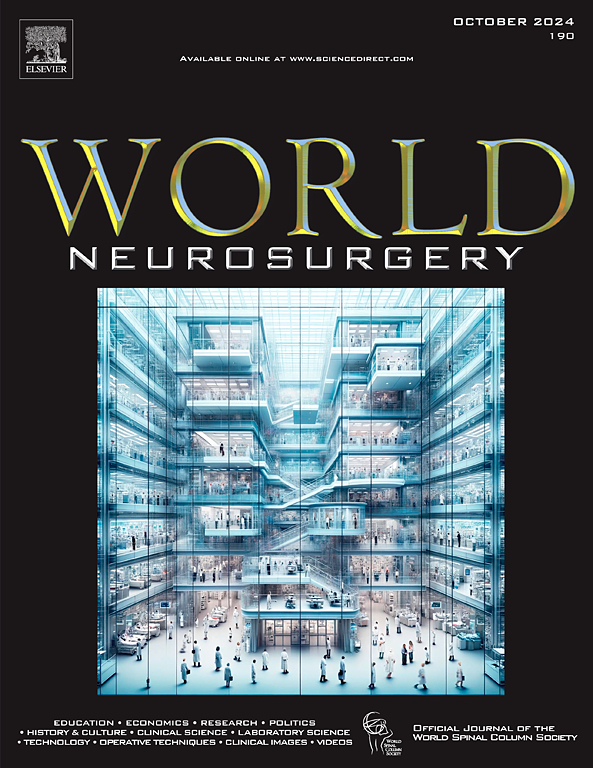回顾科克伦系统回顾数据库中的神经外科 RCT:主要发现及对未来研究的启示。
IF 2.1
4区 医学
Q3 CLINICAL NEUROLOGY
引用次数: 0
摘要
目的:为临床医生和患者提供治疗决策依据的证据最好由随机对照试验 (RCT) 提供。本研究旨在评估神经外科实践在多大程度上得到了 RCT 级别证据的支持:方法:对 Cochrane 图书馆进行了检索,以找到有关神经外科手术干预有效性的综述。提取的数据包括干预措施、患者人群和结果测量,以及由 Cochrane 作者评定的证据强度。对提取的数据进行分析,以确定 Cochrane 综述中包含的 RCTs 之间的差距和(不)一致之处:共有 52 篇科克伦综述符合纳入标准,涵盖 8 个神经外科亚专科。然而,只有 28 篇发表于 2015 年之后。对多种常用神经外科干预措施的覆盖范围有限,9 篇综述未发现与其选定主题相关的研究性临床试验。在28篇综述中,对5项或更少的试验结果进行了综合。在研究类似干预措施的试验中,主要结果也不尽相同。不同亚专科的证据总体质量评级各不相同,大多数综述将证据评级为极低至低:支持神经外科实践的 RCT 级别证据多种多样,所测试的结果仍以异质性为主。仍有一些重要的神经外科疾病的治疗策略没有高质量的证据支持。务实的 RCT、精心设计的观察性研究以及健全的审计和登记程序可为神经外科治疗决策提供真实世界的证据。本文章由计算机程序翻译,如有差异,请以英文原文为准。

A Review of Neurosurgical randomized controlled trials in the Cochrane Database of Systematic Reviews: Key Findings and Implications for Future Research
Objective
Evidence available to clinicians and patients to inform treatment decisions is ideally produced by randomized controlled trials (RCTs). The objective of this study was to assess the extent to which neurosurgical practice is supported by RCT-level evidence.
Methods
A search of the Cochrane Library was conducted to find reviews of the effectiveness of neurosurgical operative interventions. Data were extracted on the intervention, patient population, and outcome measures as well as the strength of evidence, as rated by the Cochrane authors. The extracted data were analyzed to identify the gaps and areas of (in)consistency across the RCTs included within the Cochrane Reviews.
Results
A total of 52 Cochrane Reviews met the inclusion criteria, which covered 8 neurosurgical subspecialties. However, only 28 were published after 2015. There was limited coverage of multiple commonly performed neurosurgical interventions and 9 reviews found no RCTs related to their selected topic. In 28 reviews, results were synthesized from 5 or fewer trials. Primary outcomes also varied among trials examining similar interventions. The overall quality rating of the evidence for the different subspecialties varied, with the majority of reviews rating the evidence as being from very low to low.
Conclusions
The RCT-level evidence supporting neurosurgical practice is varied and the outcomes tested remain predominantly heterogeneous. There remain important neurosurgical conditions where treatment strategies are not underpinned by high-quality evidence. Pragmatic RCTs, well-designed observational studies as well as robust audit and registry processes may provide the real-world evidence for treatment decisions in neurosurgical care.
求助全文
通过发布文献求助,成功后即可免费获取论文全文。
去求助
来源期刊

World neurosurgery
CLINICAL NEUROLOGY-SURGERY
CiteScore
3.90
自引率
15.00%
发文量
1765
审稿时长
47 days
期刊介绍:
World Neurosurgery has an open access mirror journal World Neurosurgery: X, sharing the same aims and scope, editorial team, submission system and rigorous peer review.
The journal''s mission is to:
-To provide a first-class international forum and a 2-way conduit for dialogue that is relevant to neurosurgeons and providers who care for neurosurgery patients. The categories of the exchanged information include clinical and basic science, as well as global information that provide social, political, educational, economic, cultural or societal insights and knowledge that are of significance and relevance to worldwide neurosurgery patient care.
-To act as a primary intellectual catalyst for the stimulation of creativity, the creation of new knowledge, and the enhancement of quality neurosurgical care worldwide.
-To provide a forum for communication that enriches the lives of all neurosurgeons and their colleagues; and, in so doing, enriches the lives of their patients.
Topics to be addressed in World Neurosurgery include: EDUCATION, ECONOMICS, RESEARCH, POLITICS, HISTORY, CULTURE, CLINICAL SCIENCE, LABORATORY SCIENCE, TECHNOLOGY, OPERATIVE TECHNIQUES, CLINICAL IMAGES, VIDEOS
 求助内容:
求助内容: 应助结果提醒方式:
应助结果提醒方式:


